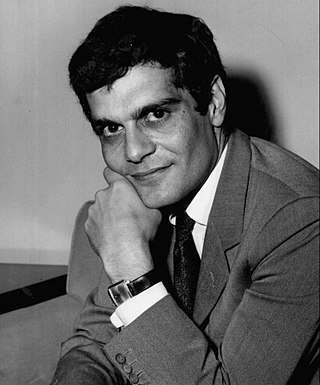
Imhotep was an Egyptian chancellor to the Pharaoh Djoser, possible architect of Djoser's step pyramid, and high priest of the sun god Ra at Heliopolis. Very little is known of Imhotep as a historical figure, but in the 3,000 years following his death, he was gradually glorified and deified.

Muhammad Anwar es-Sadat was an Egyptian politician and military officer who served as the third president of Egypt, from 15 October 1970 until his assassination by fundamentalist army officers on 6 October 1981. Sadat was a senior member of the Free Officers who overthrew King Farouk in the Egyptian Revolution of 1952, and a close confidant of President Gamal Abdel Nasser, under whom he served as Vice President twice and whom he succeeded as president in 1970. In 1978, Sadat and Menachem Begin, Prime Minister of Israel, signed a peace treaty in cooperation with United States President Jimmy Carter, for which they were recognized with the Nobel Peace Prize.
Plague or The Plague may refer to:

In Egyptian mythology, Sekhmet, is a warrior goddess as well as goddess of medicine.

Omar Sharif was an Egyptian actor, generally regarded as one of his country's greatest male film stars. He began his career in his native country in the 1950s. He is best known for his appearances in American, British, French, and Italian productions. His career encompassed over 100 films spanning 50 years, and brought him many accolades including three Golden Globe Awards and a César Award for Best Actor.

The Prince of Egypt is a 1998 American animated musical drama film produced by DreamWorks Animation and released by DreamWorks Pictures. The second feature film from DreamWorks and the first to be traditionally animated, it is an adaptation of the Book of Exodus and follows the life of Moses from being a prince of Egypt to a prophet chosen by God to carry out his ultimate destiny of leading the Hebrews out of Egypt. The film was directed by Brenda Chapman, Steve Hickner, and Simon Wells, and produced by Jeffrey Katzenberg, Penney Finkelman Cox, and Sandra Rabins, from a screenplay written by Philip LaZebnik. It features songs written by Stephen Schwartz and a score composed by Hans Zimmer. The film stars the voices of Val Kilmer, Ralph Fiennes, Michelle Pfeiffer, Sandra Bullock, Jeff Goldblum, Danny Glover, Patrick Stewart, Helen Mirren, Steve Martin, and Martin Short.

Geraldine Leigh Chaplin is a British-American actress.
A biographical film or biopic is a film that dramatizes the life of a non-fictional or historically-based person or people. Such films show the life of a historical person and the central character's real name is used. They differ from docudrama films and historical drama films in that they attempt to comprehensively tell a single person's life story or at least the most historically important years of their lives.

Khairy Beshara is an Egyptian film director active in the Egyptian film industry since the 1970s. He is considered one of the Egyptian directors who re-defined Realism in Egyptian cinema in the 1980s. In a recent book published by Bibliotheca Alexandrina in 2007 about the most important 100 films in the history of Egyptian cinema, three of his movies were listed: The Collar and the Bracelet, Bitter Day, Sweet Day, and Ice Cream in Gleem.

Tanta University is an Egyptian university in the city of Tanta, Al Gharbiyah governorate, Egypt. The university is under the direct scientific supervision of the Ministry of Higher Education.

Death on the Nile is a 1978 British mystery film based on Agatha Christie's 1937 novel of the same name, directed by John Guillermin and adapted by Anthony Shaffer. The film features the Belgian detective Hercule Poirot, played by Peter Ustinov for the first time, plus an all-star supporting cast that includes Maggie Smith, Angela Lansbury, Bette Davis, Mia Farrow, Jane Birkin, David Niven, George Kennedy, and Jack Warden. The film is a follow-up to the 1974 film Murder on the Orient Express.
Middle Eastern cinema collectively refers to the film industries of West Asia and part of North Africa. By definition, it encompasses the film industries of Egypt, Iran, Bahrain, Iraq, Israel, Jordan, Kuwait, Lebanon, Palestine, Oman, Qatar, Saudi Arabia, Syria, United Arab Emirates, and Yemen. As such, the film industries of these countries are also part of the cinema of Asia, or in the case of Egypt, Africa.

Salah Abu Seif was one of the most famous Egyptian film directors, and is considered to be the godfather of Neorealist cinema in Egyptian cinema. Many of the 41 films he directed are considered Egyptian classics with 11 films in the Top 100 Egyptian films list. His film The Beginning and the End (1960) was the first adaptation of a novel by Nobel Prize winner Naguib Mahfouz. In 1977 he was a member of the jury at the 10th Moscow International Film Festival.
The following is a list of Egyptian films. The year order is split by decade. For an alphabetical list of films currently on Wikipedia, see Category:Egyptian films.

The cinema of Egypt refers to the flourishing film industry based in Cairo, sometimes also referred to as Hollywood of the East or Hollywood on the Nile. Since 1976, the capital has held the annual Cairo International Film Festival, which has been accredited by the FIAPF. There are an additional 12 festivals. Of the more than 4,000 short and feature-length films made in MENA region since 1908, more than three-quarters were Egyptian films. Egyptian films are typically spoken in the Egyptian Arabic dialect.

Salah El-Din Ahmed Mourad Zulfikar was an Egyptian actor and film producer. He started his career as a police officer in the Egyptian National Police, before becoming an actor in 1956. He is regarded as one of the most influential actors in the history of the Egyptian film industry. Zulfikar had roles in more than a hundred feature films in multiple genres during a 37-year career, mostly as the leading actor. He was one of the most dominant leading men in Egyptian cinema.













